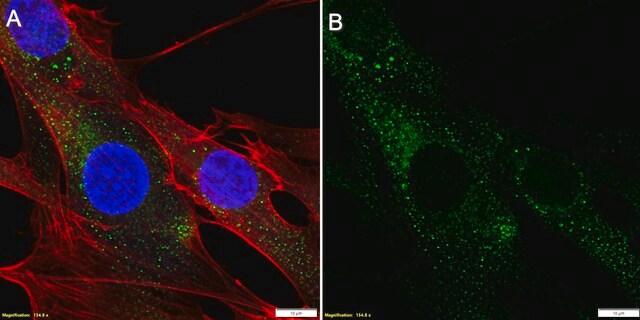03940590
Epicatechin
primary reference standard
Sinónimos:
(−)-Epicatechin, (−)-cis-3,3′,4′,5,7-Pentahydroxyflavane, (2R,3R)-2-(3,4-Dihydroxyphenyl)-3,4-dihydro-1(2H)-benzopyran-3,5,7-triol
About This Item
Productos recomendados
grade
primary reference standard
shelf life
limited shelf life, expiry date on the label
manufacturer/tradename
HWI
mp
240 °C (dec.) (lit.)
application(s)
food and beverages
storage temp.
−20°C
SMILES string
O[C@@H]1Cc2c(O)cc(O)cc2O[C@@H]1c3ccc(O)c(O)c3
InChI
1S/C15H14O6/c16-8-4-11(18)9-6-13(20)15(21-14(9)5-8)7-1-2-10(17)12(19)3-7/h1-5,13,15-20H,6H2/t13-,15-/m1/s1
InChI key
PFTAWBLQPZVEMU-UKRRQHHQSA-N
¿Está buscando productos similares? Visita Guía de comparación de productos
Categorías relacionadas
General description
Exact content by quantitative NMR can be found on the certificate.
Application
signalword
Warning
hcodes
Hazard Classifications
Eye Irrit. 2 - Skin Irrit. 2 - STOT SE 3
target_organs
Respiratory system
Storage Class
11 - Combustible Solids
wgk_germany
WGK 3
flash_point_f
Not applicable
flash_point_c
Not applicable
Elija entre una de las versiones más recientes:
Certificados de análisis (COA)
¿No ve la versión correcta?
Si necesita una versión concreta, puede buscar un certificado específico por el número de lote.
¿Ya tiene este producto?
Encuentre la documentación para los productos que ha comprado recientemente en la Biblioteca de documentos.
Los clientes también vieron
Artículos
Validated HPLC method (based on Ph. Eur. Monograph 2668) for quantifying catechins and caffeine in decaffeinated green tea using a Chromolith® High Resolution RP-18e column with advantages in terms of backpressure and matrix robustness.
Validated HPLC method (based on Ph. Eur. Monograph 2668) for quantifying catechins and caffeine in decaffeinated green tea using a Chromolith® High Resolution RP-18e column with advantages in terms of backpressure and matrix robustness.
Validated HPLC method (based on Ph. Eur. Monograph 2668) for quantifying catechins and caffeine in decaffeinated green tea using a Chromolith® High Resolution RP-18e column with advantages in terms of backpressure and matrix robustness.
Validated HPLC method (based on Ph. Eur. Monograph 2668) for quantifying catechins and caffeine in decaffeinated green tea using a Chromolith® High Resolution RP-18e column with advantages in terms of backpressure and matrix robustness.
Nuestro equipo de científicos tiene experiencia en todas las áreas de investigación: Ciencias de la vida, Ciencia de los materiales, Síntesis química, Cromatografía, Analítica y muchas otras.
Póngase en contacto con el Servicio técnico








